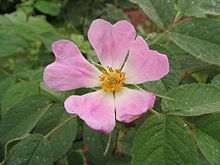Rosa mollis is a species of wild rose.[1] Common name: soft downy-rose.[2] It is most closely related to Rosa villosa.[3]: 98 Rosa mollis can be distinguished from Rosa villosa by its longer leaves and pruinose stem, which is absent in the latter.[4] Rosa mollis usually blossoms in Germany for approximately 5 weeks from the end of June to July[5]
| Rosa mollis | |
|---|---|

| |
| Scientific classification | |
| Kingdom: | Plantae |
| Clade: | Tracheophytes |
| Clade: | Angiosperms |
| Clade: | Eudicots |
| Clade: | Rosids |
| Order: | Rosales |
| Family: | Rosaceae |
| Genus: | Rosa |
| Species: | R. mollis
|
| Binomial name | |
| Rosa mollis | |
It is native to the Caucasus[1] and parts of Europe: the British Isles, Scandinavia, and the lands around the Baltic. It has been commonly reported in isolated areas throughout the rest of Europe; this fact has prompted the editors of Atlas Florae Europaeae to raise the question whether these may not be cases of misidentification of either Rosa villosa or Rosa sherardii.[3]: 101–2
Description
editThis section is empty. You can help by adding to it. (February 2024) |
References
edit- ^ a b "Rosa mollis Sm. | Plants of the World Online | Kew Science". Plants of the World Online. Retrieved 4 February 2021.
- ^ Rosa mollis Sm.
- ^ a b Kurtto, Arto; Lampinen, Raino; Junikka, Leo (2004). Atlas florae Europaeae, distribution of vascular plants in Europe. 13: Rosaceae (Spiraea to Fragaria, excl. Rubus). Helsinki: Committee for mapping the flora of Europe and Societas Biologica Fennica. ISBN 978-951-9108-14-8.
- ^ Kellner, Alexandra; Ritz, Christiane M; Wissemann, Volker (2013-12-20). "Low genetic and morphological differentiation in the European species complex of Rosa sherardii, R. mollis and R. villosa (Rosa section Caninae subsection Vestitae): Population Genetics in Dog Roses (Vestitae)". Botanical Journal of the Linnean Society. 174 (2): 240–256. doi:10.1111/boj.12124.
- ^ Kellner, Alexandra; Ritz, Christiane M.; Wissemann, Volker (2012-10-19). "Hybridization with invasive Rosa rugosa threatens the genetic integrity of native Rosa mollis: Hybridization in Rosa". Botanical Journal of the Linnean Society. 170 (3): 472–484. doi:10.1111/j.1095-8339.2012.01298.x.